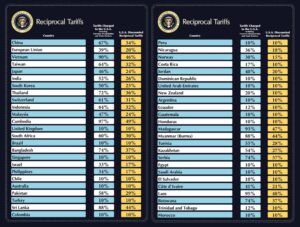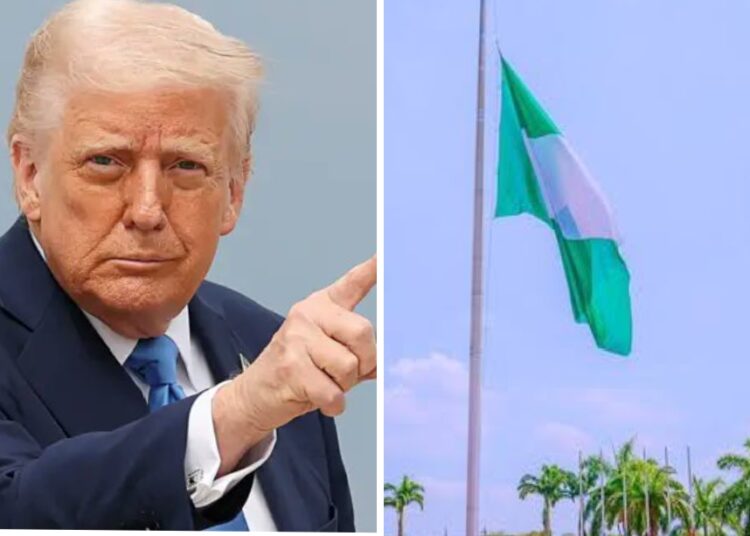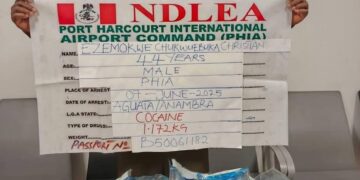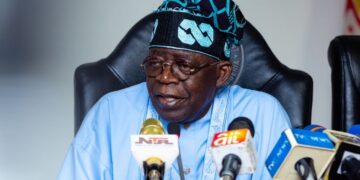
In a move that could escalate global trade tensions, U.S. President Donald Trump on Wednesday announced new reciprocal tariffs, imposing duties on imports from several countries, including Nigeria.
The announcement came during an event he dubbed “Liberation Day”, where he outlined his administration’s plan to counter what he described as unfair trade practices.
Under the new policy, Nigerian exports to the U.S. will now face a 14% tariff, a measure Trump said was in response to Nigeria’s existing 27% tariff on American goods.
Last year, Nigeria exported goods worth N931 billion to the U.S., with crude oil making up the bulk of the shipments, while imports from the U.S. totaled N1.05 trillion.
Displaying a tariff comparison chart, Trump explained the basis of his policy, highlighting that China would face a 34% tariff, while the European Union (EU) would be hit with a 20% tariff. Other affected nations include Vietnam (46%), Taiwan (32%), Japan (24%), India (26%), South Korea (25%), Thailand (36%), and Cambodia (49%).
At the White House Rose Garden event, Trump signed two executive orders. The first closes the “de minimis loophole”, which has allowed China to export low-cost goods to the U.S. without paying duties. The second enforces the reciprocal tariff structure, introducing a 25% tariff on imported cars and tariffs ranging from 10% to 49% on various imported goods.
Trump defended the tariffs, claiming they would generate $6 trillion in investments, but experts warn that such measures effectively act as a tax hike on American businesses and consumers.
Meanwhile, the European Union, which is directly affected by the new tariffs, has said it will respond today, with European Commission President Ursula von der Leyen expected to make an official statement.

In a move that could escalate global trade tensions, U.S. President Donald Trump on Wednesday announced new reciprocal tariffs, imposing duties on imports from several countries, including Nigeria.
The announcement came during an event he dubbed “Liberation Day”, where he outlined his administration’s plan to counter what he described as unfair trade practices.
Under the new policy, Nigerian exports to the U.S. will now face a 14% tariff, a measure Trump said was in response to Nigeria’s existing 27% tariff on American goods.
Last year, Nigeria exported goods worth N931 billion to the U.S., with crude oil making up the bulk of the shipments, while imports from the U.S. totaled N1.05 trillion.
Displaying a tariff comparison chart, Trump explained the basis of his policy, highlighting that China would face a 34% tariff, while the European Union (EU) would be hit with a 20% tariff. Other affected nations include Vietnam (46%), Taiwan (32%), Japan (24%), India (26%), South Korea (25%), Thailand (36%), and Cambodia (49%).
At the White House Rose Garden event, Trump signed two executive orders. The first closes the “de minimis loophole”, which has allowed China to export low-cost goods to the U.S. without paying duties. The second enforces the reciprocal tariff structure, introducing a 25% tariff on imported cars and tariffs ranging from 10% to 49% on various imported goods.
Trump defended the tariffs, claiming they would generate $6 trillion in investments, but experts warn that such measures effectively act as a tax hike on American businesses and consumers.
Meanwhile, the European Union, which is directly affected by the new tariffs, has said it will respond today, with European Commission President Ursula von der Leyen expected to make an official statement.

In a move that could escalate global trade tensions, U.S. President Donald Trump on Wednesday announced new reciprocal tariffs, imposing duties on imports from several countries, including Nigeria.
The announcement came during an event he dubbed “Liberation Day”, where he outlined his administration’s plan to counter what he described as unfair trade practices.
Under the new policy, Nigerian exports to the U.S. will now face a 14% tariff, a measure Trump said was in response to Nigeria’s existing 27% tariff on American goods.
Last year, Nigeria exported goods worth N931 billion to the U.S., with crude oil making up the bulk of the shipments, while imports from the U.S. totaled N1.05 trillion.
Displaying a tariff comparison chart, Trump explained the basis of his policy, highlighting that China would face a 34% tariff, while the European Union (EU) would be hit with a 20% tariff. Other affected nations include Vietnam (46%), Taiwan (32%), Japan (24%), India (26%), South Korea (25%), Thailand (36%), and Cambodia (49%).
At the White House Rose Garden event, Trump signed two executive orders. The first closes the “de minimis loophole”, which has allowed China to export low-cost goods to the U.S. without paying duties. The second enforces the reciprocal tariff structure, introducing a 25% tariff on imported cars and tariffs ranging from 10% to 49% on various imported goods.
Trump defended the tariffs, claiming they would generate $6 trillion in investments, but experts warn that such measures effectively act as a tax hike on American businesses and consumers.
Meanwhile, the European Union, which is directly affected by the new tariffs, has said it will respond today, with European Commission President Ursula von der Leyen expected to make an official statement.

In a move that could escalate global trade tensions, U.S. President Donald Trump on Wednesday announced new reciprocal tariffs, imposing duties on imports from several countries, including Nigeria.
The announcement came during an event he dubbed “Liberation Day”, where he outlined his administration’s plan to counter what he described as unfair trade practices.
Under the new policy, Nigerian exports to the U.S. will now face a 14% tariff, a measure Trump said was in response to Nigeria’s existing 27% tariff on American goods.
Last year, Nigeria exported goods worth N931 billion to the U.S., with crude oil making up the bulk of the shipments, while imports from the U.S. totaled N1.05 trillion.
Displaying a tariff comparison chart, Trump explained the basis of his policy, highlighting that China would face a 34% tariff, while the European Union (EU) would be hit with a 20% tariff. Other affected nations include Vietnam (46%), Taiwan (32%), Japan (24%), India (26%), South Korea (25%), Thailand (36%), and Cambodia (49%).
At the White House Rose Garden event, Trump signed two executive orders. The first closes the “de minimis loophole”, which has allowed China to export low-cost goods to the U.S. without paying duties. The second enforces the reciprocal tariff structure, introducing a 25% tariff on imported cars and tariffs ranging from 10% to 49% on various imported goods.
Trump defended the tariffs, claiming they would generate $6 trillion in investments, but experts warn that such measures effectively act as a tax hike on American businesses and consumers.
Meanwhile, the European Union, which is directly affected by the new tariffs, has said it will respond today, with European Commission President Ursula von der Leyen expected to make an official statement.

















